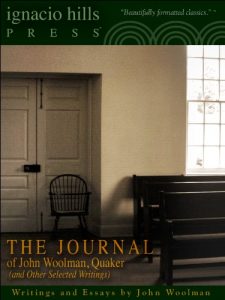NOTE: This edition has a linked "Table of Contents" and has been beautifully formatted (searchable and interlinked) to work on your Amazon e-book reader, iPad e-book reader, iPhone e-book reader, BlackBerry e-book reader, Android e-book reader, iPod e-book reader and your Amazon Desktop Reader.
In this volume:
- The Selected Letters of John Woolman
- The Journal of John Woolman
- Considerations on the Keeping of Negros
John Woolman (October 19, 1720 – October 7, 1772) was a Quaker preacher, traveling throughout the American colonies, advocating against conscription, military taxation, and particularly slavery.
Woolman showed unusual insight for the time, in that he lived and worked among the Indians, recognizing that the Spirit moved among them also. He showed concern for the poor, for animals, and for the environment, his Quakerly witness qualifying as one of the earliest precedents to modern campaigns and sensibilities in those areas.
In Woolman's travels, whenever he received hospitality from a slaveholder, he insisted on paying the slaves for their work in attending him. He would also refuse to be served with silver cups, plates, and utensils, on grounds that slaves were forced to dig such precious minerals and gems for the rich. On one occasion in his early adulthood, he did convey the ownership of a slave in someone's will, but was later so filled with remorse over the act that he went back, found the individual so injured, and made monetary reparations sufficient to sustain that person in freedom for some years.
The Journal of John Woolman is not only considered to be an important spiritual document, but also a classic in English literature. It is reportedly the longest-published book in the history of North America other than the Bible, having been continuously published since before the 1776 revolution.
A great example of life in a simpler time.
In this volume:
- The Selected Letters of John Woolman
- The Journal of John Woolman
- Considerations on the Keeping of Negros
John Woolman (October 19, 1720 – October 7, 1772) was a Quaker preacher, traveling throughout the American colonies, advocating against conscription, military taxation, and particularly slavery.
Woolman showed unusual insight for the time, in that he lived and worked among the Indians, recognizing that the Spirit moved among them also. He showed concern for the poor, for animals, and for the environment, his Quakerly witness qualifying as one of the earliest precedents to modern campaigns and sensibilities in those areas.
In Woolman's travels, whenever he received hospitality from a slaveholder, he insisted on paying the slaves for their work in attending him. He would also refuse to be served with silver cups, plates, and utensils, on grounds that slaves were forced to dig such precious minerals and gems for the rich. On one occasion in his early adulthood, he did convey the ownership of a slave in someone's will, but was later so filled with remorse over the act that he went back, found the individual so injured, and made monetary reparations sufficient to sustain that person in freedom for some years.
The Journal of John Woolman is not only considered to be an important spiritual document, but also a classic in English literature. It is reportedly the longest-published book in the history of North America other than the Bible, having been continuously published since before the 1776 revolution.
A great example of life in a simpler time.






